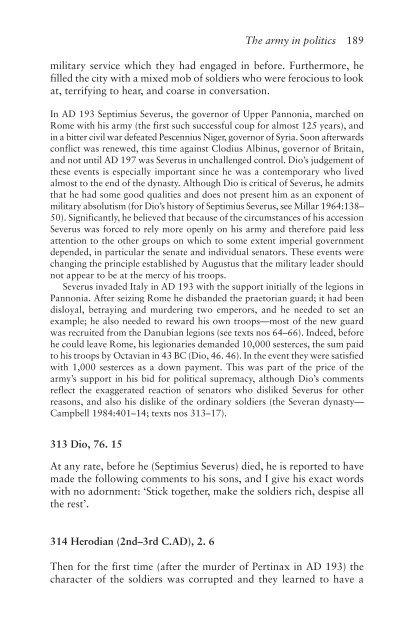The Roman Army, 31 BC–AD 337: A Sourcebook
The Roman Army, 31 BC–AD 337: A Sourcebook
The Roman Army, 31 BC–AD 337: A Sourcebook
Create successful ePaper yourself
Turn your PDF publications into a flip-book with our unique Google optimized e-Paper software.
<strong>The</strong> army in politics 189<br />
military service which they had engaged in before. Furthermore, he<br />
filled the city with a mixed mob of soldiers who were ferocious to look<br />
at, terrifying to hear, and coarse in conversation.<br />
In AD 193 Septimius Severus, the governor of Upper Pannonia, marched on<br />
Rome with his army (the first such successful coup for almost 125 years), and<br />
in a bitter civil war defeated Pescennius Niger, governor of Syria. Soon afterwards<br />
conflict was renewed, this time against Clodius Albinus, governor of Britain,<br />
and not until AD 197 was Severus in unchallenged control. Dio’s judgement of<br />
these events is especially important since he was a contemporary who lived<br />
almost to the end of the dynasty. Although Dio is critical of Severus, he admits<br />
that he had some good qualities and does not present him as an exponent of<br />
military absolutism (for Dio’s history of Septimius Severus, see Millar 1964:138–<br />
50). Significantly, he believed that because of the circumstances of his accession<br />
Severus was forced to rely more openly on his army and therefore paid less<br />
attention to the other groups on which to some extent imperial government<br />
depended, in particular the senate and individual senators. <strong>The</strong>se events were<br />
changing the principle established by Augustus that the military leader should<br />
not appear to be at the mercy of his troops.<br />
Severus invaded Italy in AD 193 with the support initially of the legions in<br />
Pannonia. After seizing Rome he disbanded the praetorian guard; it had been<br />
disloyal, betraying and murdering two emperors, and he needed to set an<br />
example; he also needed to reward his own troops—most of the new guard<br />
was recruited from the Danubian legions (see texts nos 64–66). Indeed, before<br />
he could leave Rome, his legionaries demanded 10,000 sesterces, the sum paid<br />
to his troops by Octavian in 43 BC (Dio, 46. 46). In the event they were satisfied<br />
with 1,000 sesterces as a down payment. This was part of the price of the<br />
army’s support in his bid for political supremacy, although Dio’s comments<br />
reflect the exaggerated reaction of senators who disliked Severus for other<br />
reasons, and also his dislike of the ordinary soldiers (the Severan dynasty—<br />
Campbell 1984:401–14; texts nos <strong>31</strong>3–17).<br />
<strong>31</strong>3 Dio, 76. 15<br />
At any rate, before he (Septimius Severus) died, he is reported to have<br />
made the following comments to his sons, and I give his exact words<br />
with no adornment: ‘Stick together, make the soldiers rich, despise all<br />
the rest’.<br />
<strong>31</strong>4 Herodian (2nd–3rd C.AD), 2. 6<br />
<strong>The</strong>n for the first time (after the murder of Pertinax in AD 193) the<br />
character of the soldiers was corrupted and they learned to have a



